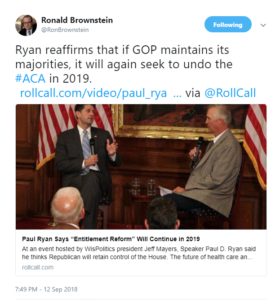Yesterday, Speaker Paul Ryan claimed that Republicans support Medicare. On the topic of health care and entitlement reform, Ryan said: “I think they want to see that we have Medicare on a path to solvency.”
The truth is that Paul Ryan and the Republican Party have attempted to gut Medicare every chance they could:
- Paul Ryan, December 2017: “It’s the biggest entitlement we’ve got to reform.” Ryan said: “We’re going to have to get back next year at entitlement reform, which is how you tackle the debt and the deficit…Frankly, it’s the health care entitlements that are the big drivers of our debt, so we spend more time on the health care entitlements…In- think the president is understanding that choice and competition works everywhere in health care, especially in Medicare…This has been my big thing for many, many years. I think it’s the biggest entitlement we’ve got to reform.”
- Paul Ryan is targeting Medicare and Medicaid to pay for tax cuts for the wealthiest. Last December, President Trump signed a $1.5 trillion tax bill that disproportionately benefits the wealthy. How do Republicans plan on paying for it? Speaker Ryan’s answer is clear: “Frankly, it’s the health care entitlements that are the big drivers of our debt.” In an attempt to pay for these tax cuts, in April, House Republicans passed a budget amendment that would slash Medicare funding by $537 billion over the next decade.
- Ryan proposed these cuts after passing a budget resolution last year that cut Medicare by $473 billion. The 2018 budget resolution passed by Republicans in December 2017 cut Medicare by $473 billion.
- Ryan has called to transform Medicare into a voucher program, which experts warn would lead to the “demise” of the program. Speaker Ryan has spoken about turning Medicare into a voucher system, and in Fall 2017, the Centers for Medicare and Medicaid services filed a Request for Information concerning a shift in a “new direction” for Medicare, which Senate Democrats worried might entail a voucher system. Experts warn, and Republicans including Newt Gingrich acknowledge, that such a shift would lead to the demise of traditional Medicare as premiums increase.
- Led by Ryan, Congressional Republicans repealed several components of the ACA designed to help keep Medicare’s costs down, effectively driving up costs for the program. By repealing the requirement that most people have insurance, Congressional Republicans knowingly voted for a measure expected to increase the number of uninsured. The 2018 Medicare Trustees Report predicts that this increase will increase the share of subsidies paid to hospitals via Medicare. Similarly, by repealing the Independent Payment Advisory Board, Congressional Republicans took away a mechanism that slowed Medicare cost growth.
- A report published by the Medicare Trustees finds that the program is worse-off financially because of Paul Ryan and Congressional Republicans’ actions. In the 2018 Medicare Trustees Report, trustees found that actions taken by President Trump and Congressional Republicans actually push make Medicare less financially stable. The Trustees point to the elimination of the Independent Payment Advisory Board (IPAB), which had been developed to extend the solvency of Medicare and slow cost growth. Without the IPAB, there is no mechanism to achieve those ends. Similarly, Republican tax cuts will reduce income for Medicare. In conjunction, both actions damage the financial stability of Medicare.

